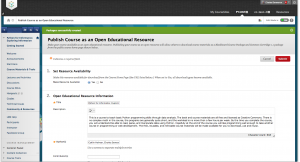Note: Since this post mentions Blackboard, I want to remind everyone that I do work for Blackboard as the Sakai Chief Strategist in addition to working as a faculty member for the University of Michigan. The statements in this post are my own and do not reflect any official Blackboard positions or directions.
I have been having great fun teaching my Internet History, Technology, and Security (IHTS) MOOC using Coursera. The class is now on its third iteration with about 120,000 students total across all three sections of the course and about 12,000 students earning certificates. I love how the large-scale of these courses allows me to touch so many people around the world. I can hold office hours in any large city in the world and meet and interact with my students. This is a video filmed by one of my students (Nico Morrison) where he captured about 15 minutes of the actual conversations that happen in a typical office hours:
London Office Hours Video (Extended edition) (13:39)
I hope more students bring cameras to my office hours – the videos I make for the office hours are more in the “hello world” style:
But for me the “Massive” in MOOC is only part of the story. Over the past decade, I have spent a lot of time pushing for Open Educational Resources (OER), and standards and tools to advance the cause of OER materials in education.
A Focus on Remixability – Python for Informatics
In order for me to “walk the walk” of OER and experience the real issues and challenges in remixable OER, I have another course where I am pushing on the Open Educational Resource and focusing on pushing on the “Remixability” dimension. My course based on my Python for Informatics: Exploring Information CC-BY-SA licensed text book is supported by CC-BY course materials and Apache licensed software.
Here are my OER Materials for Python for Informatics
These materials include the book, all slide sets, all video lectures, and the auto-grading software. I provide the materials both in a kit of files and instructions and as course exports from Moodle, Blackboard, and IMS Common Cartridge.
An Exercise in Teaching on Multiple Platforms
As an exercise in proving that the materials are indeed reusable I have taught my class using the materials on Moodle on Dr. Chuck Online and on Blackboard’s free hosted CourseSites. platform. I also put the materials up as a Python course in Peer-to-Peer University.
Here is what the courses look like in Moodle 2.5 (with the new pretty default skin) and in Blackboard’s CourseSites:
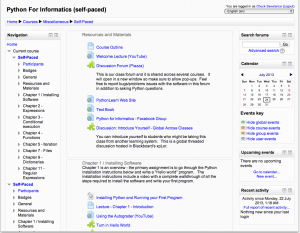
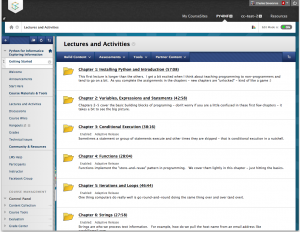
None of these offerings has attracted massive numbers of students. I have about 3000 students enrolled between the three courses. The courses follow a self-paced model so there is less time pressure for students and less stress for me. Students complete the course and earn a badge.
My goal was to prove that I could quickly construct a course on a new system reusing the materials. I was able to put up the CourseSites instance of my course over couple of days and was able to put up my P2PU course up in about a day. The P2PU class was easier to put up because there is no auto-grading – all the grading is done by peers in P2PU.
Building a Learner Community Around Remixed Content
One of my other dreams is that we would create communities of interest around learning content. I would love to have a forum / mailing list that brought all of the people interested in using my Python for Informatics book and materials together where we could exchange ideas and remixed materials with each other.
I have not yet started to build such a community, but I am using Blackboard’s xpLor product to connect the two instances of my Python course running on Dr. Chuck Online (Moodle) and CourseSites (Blackboard Learn). Here are screen shots of that cross-LMS forum hosted in xpLor linked from each of the courses:
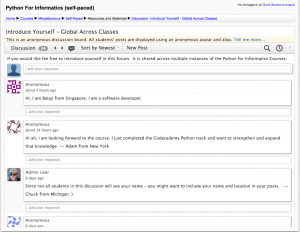
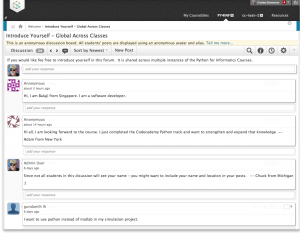
This forum linkage is using xpLor and IMS Learning Tools Interoperability and was the subject of my recent presentation at Blackboard’s BbWorld 2013 conference.
A Community of and For Teachers
One of my core beliefs is that for remix-ability to work we need places for teachers to find, exchange, remix, and publish materials. This requires both interoperability standards like IMS Common Cartridge as well a sites like YouTube where people can congregate.
Blackboard has put a lot of effort into Learn to support standards like IMS Common Cartridge and IMS Learning Tools Interoperability and has added nice features to CourseSites to make publishing a CourseSites course as open content. Once I had built my course in CourseSites, there is a control panel option to make my materials freely available on the web. Here is a screen shot of what it takes to publish a Blackboard backup and IMS Common Cartridge from CourseSites:
Every instructor on CourseSites has their own page. Mine is drchuck.coursesites.com and all the open content that each of us publishes is automatically made available on each course page linked from the Instructor page:
Python for Informatics on CourseSites
Scroll to the bottom of this page to see the links to the open content that was automatically produced by CourseSites.
Some Reflection
So I have this open, free and re-mixable course. Students can take the course and leave with the materials to use in their own courses. What next?
Well the first observation is that not too much has happened. At this moment I think that the urge for teachers to remix each others materials is still a pre-emergent concept. It does not have a “viral factor” where people tell each other about the idea so that it experiences rapid super-linear growth (look at the stats).
I have never been too upset working hard in an area that is still pre-emergent. At times, you do get the sense that no one cares and that no one will ever care. I got that feeling a lot when I was working on IMS Learning Tools Interoperability from 2004-2010 – but things turned out nicely on that front. So I will just keep pushing forward wherever and however I feel I can push to advance this cause with technology and standards.
